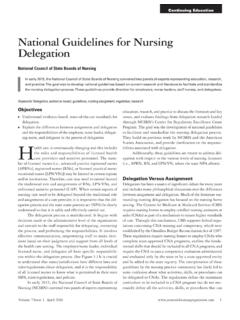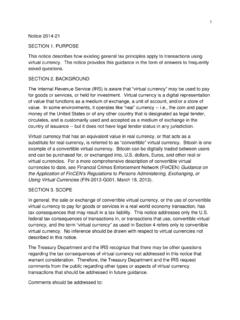Transcription of DAC Guidelines and Reference Series Quality Standards for ...
1 DAC Guidelines and Reference SeriesQuality Standards for Development EvaluationQuality Standards for development evaluationDEVELOPMENT ASSISTANCE COMMITTEEDAC Guidelines and Reference SeriesQuALITy Standards fOr DEVELOPMENT EVALuATIONorGaniSation for eConomiC Co-operation and developmentThe OECD is a unique forum where the governments of 30 democracies work together to address the economic, social and environmental challenges of globalisation. The OECD is also at the forefront of efforts to understand and to help governments respond to new developments and concerns, such as corporate governance, the information economy and the challenges of an ageing population.
2 The Organisation provides a setting where governments can compare policy experiences, seek answers to common problems, identify good practice and work to co-ordinate domestic and international OECD member countries are: Australia, Austria, Belgium, Canada, the Czech republic, Denmark, finland, france, Germany, Greece, Hungary, Iceland, Ireland, Italy, Japan, Korea, Luxembourg, Mexico, the Netherlands, New Zealand, Norway, Poland, Portugal, the Slovak republic, Spain, Sweden, Switzerland, Turkey, the united Kingdom and the united States.
3 The Commission of the European Communities takes part in the work of the OECD. OECD 2010 ISBN 978-92-64-08390-5 (PDf) you can copy, download or print OECD content for your own use, and you can include excerpts from OECD publications, databases and multimedia products in your own documents, presentations, blogs, websites and teaching materials, provided that suitable acknowledgment of OECD as source and copyright owner is given. All requests for public or commercial use and translation rights should be submitted to requests for permission to photocopy portions of this material for public or commercial use shall be addressed directly to the Copyright Clearance Center (CCC) at or the Centre fran ais d exploitation du droit de copie (CfC) at work is published on the responsibility of the Secretary-General of the OECD.
4 The opinions expressed and arguments employed herein do not necessarily reflect the official views of the Organisation or of the governments of its member network on development evaluationThe Network on Development Evaluation is a subsidiary body of the Development Assistance Committee (DAC) at the OECD. Its purpose is to increase the effectiveness of international development programmes by supporting robust, informed and independent evaluation. The Network is a unique body, bringing together 32 bilateral donors and multilateral development agencies.
5 Australia, Austria, Belgium, Canada, Denmark, the European Commission, finland, france, Germany, Greece, Ireland, Italy, Japan, Korea, Luxembourg, the Netherlands, New Zealand, Norway, Portugal, Spain, Sweden, Switzerland, the united Kingdom, the united States, the World Bank, the Asian Development Bank, the African Development Bank, the Inter-American Development Bank, the European Bank for reconstruction and Development, the united Nations Development Programme, and the International Monetary fund. for further information on the work of the DAC Evaluation Network, please visit the website or email available in french under the title: normes de qualit pour l valuation du d veloppement Standards fOr DEVELOPMENT EVALuATION1aquality evaluation should provide credible and useful evidence to strengthen accountability for development results or contribute to learning processes, or both.
6 These Standards aim to improve Quality and ultimately to reinforce the contribution of evaluation to improving development aid modalities, consensus on shared development goals and the commitments made in the Paris Declaration on Aid Effectiveness (2005) and the Accra Agenda for Action (2008) are changing the way development partners address global challenges. In this evolving development context, evaluation has an important role in informing policy decisions and helping to hold all development partners mutually accountable for development results.
7 The way development evaluation is carried out must also reflect this new context, becoming more harmonised, better aligned and increasingly country-led, to meet the evaluation needs of all DAC Quality Standards for Development Evaluation reflect this evolving framework and provide a guide to good practice in development evaluation. Built through international consensus, the Standards are intended to serve as an incentive and inspiration to improve evaluation draft Standards were approved for a three-year test phase in 2006 and have been revised based on experience.
8 A range of development partners have contributed to this process, including donors and partner countries. Initial input was provided during a workshop in New Delhi in 2005. A 2008 survey of the use of the Standards , a 2009 workshop held in Auckland and comments submitted by the members of the DAC Network on Development Evaluation, helped to improve and finalise the text, with support from the Secretariat of the OECD. The Standards were approved by the DAC Network on Development Evaluation on 8 January 2010 and endorsed by the DAC on 1 february yorkChair of the OECD DAC Network on Development Evaluationevaluation in an evolvinG development 51 overarching considerations Development evaluation 6 free and open evaluation process 6 Evaluation ethics 6 Partnership approach 7 Co-ordination and alignment 7 Capacity development 7 Quality control 72 purpose.
9 Planning and design rationale and purpose of the evaluation 8 Specific objectives of the evaluation 8 Evaluation object and scope 8 Evaluability 9 Stakeholder involvement 9 Systematic consideration of joint evaluation 9 Evaluation questions 9 Selection and application of evaluation criteria 9 Selection of approach and methodology 10 resources 10 Governance and management structures 10 Document defining purpose and expectations 10table of ContentSQuALITy Standards fOr DEVELOPMENT EVALuATION33 implementation and reporting Evaluation team 11 Independence of evaluators vis- -vis stakeholders 11 Consultation and protection of stakeholders 11 Implementation of evaluation within allotted time and budget 11 Evaluation report 11 Clarity and representativeness of summary 12 Context of the development intervention 12 Intervention logic 12 Validity and reliability of information sources 12 Explanation of the methodology used 13 Clarity of analysis 13
10 Evaluation questions answered 13 Acknowledgement of changes and limitations of the evaluation 13 Acknowledgement of disagreements within the evaluation team 13 Incorporation of stakeholders comments 144 follow-up, use and learning Timeliness, relevance and use of the evaluation 15 Systematic response to and follow-up on recommendations 15 Dissemination 15annex 1. related development evaluation publications used in this documentThe term development intervention is used in the Standards as a general term for any activity, project, programme, strategy, policy, theme, sector, instrument, modality, institutional performance, etc, aimed to promote term evaluation report is used to cover all evaluation products, which may take different forms, including written or oral reports, visual presentations, community workshops.














